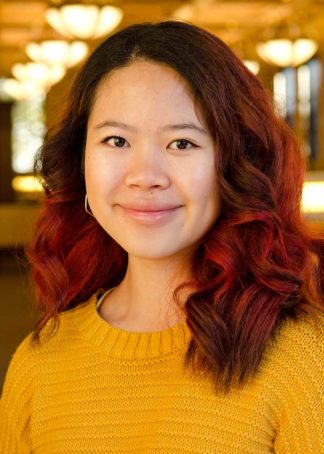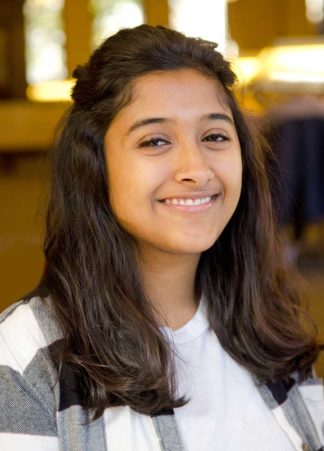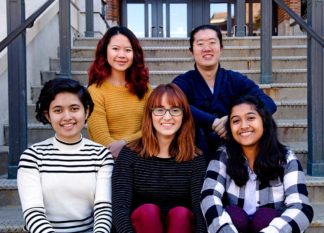By Allison Campbell-Jensen
Like standing at an unfamiliar intersection with a need to choose one from among several roads, it can be freeing or a bit daunting to be asked to write a paper on any topic you’d like. No one wants to waste time by choosing a topic that leads to a dead end.
Fortunately, students encountering such academic Seven Corners situations — and many other research puzzles — can contact the approachable experts in the U of M Libraries’ Peer Research Consultants (PRC). During this #StayAtHome period in Minnesota, their help is available online by appointment.
“There’s not a ton of guidelines,” a student told PRC Jessica Ni about her writing assignment. “I’m definitely kind of stressed about that.”
Ni, who is a junior studying Physics, Astrophysics, and Computer Science, began questioning the student about her interests, which include a passion for students’ mental health issues. “It’s very broad,” Ni said, quickly adding: “You can do it.”
Getting started with databases
Sharing a screen during their Google hangout meeting, Ni had the Woodbury high-school student click through the U of M Libraries A-Z Database list to Opposing Viewpoints in Context — one of Ni’s favorites. The Viewpoint essays highlight various positions on current issues.
“It stands out to me,” Ni explained to her about the database, “because they organize information slightly differently.”
Scopus, Google Scholar, and Web of Science are favorite databases for PRC Anaya Muralidharan, who recommended them to a student during their consultation. Both students in the consultations are participants in the U’s College in the Schools program, taking introductory college courses while still enrolled in high school.
Narrowing the search
The second student’s initial topic also was broad — affirmative action in college admissions. “I took it from a favorite episode of Patriot Act,” she said, citing the Netflix show with Hasan Minhaj.
Then Muralidharan, a junior majoring in Music Therapy and minoring in Neuroscience, guided the student through a Scopus database search that initially resulted in 892 results. By using keywords and other limiting factors, they narrowed that list down to 26 sources. Muralidharan recommended checking how many times articles have been cited by others.
The student asked: “Does that make it more credible?” “Yes, it can,” Muralidharan said.
In her follow-up note to the student, Muralidharan reprised their interaction and search results. She added a few more sources, including the opportunities to Chat 24/7 with a librarian: “Especially useful,” she wrote, “if you’re looking for specific data or sources later on.”
Demand for peer help is spiking
Muralidharan and Ni are two of the five Peer Research Consultants active this academic year. So far this spring, they have been about three times busier than in the same period last year, says Andrew Palahniuk, PRC Program Lead.
He suspects that is because, under the Minnesota #StayAtHome order, “instructors, knowing that students aren’t venturing far outside of their homes or neighborhoods, will now need to be directed to online help.”
‘I really appreciate how wonderful the U is to work with’
While PRCs typically are helping out U undergrads, Woodbury teacher Karen Morrill and her 42 CIS students took advantage of their expertise earlier this spring. Morrill noted that statistics show students who use library resources — such as consultations with PRCs — are much more likely to succeed.
“It makes so much sense for them to get fantastic help from the expert researchers at the U, who have a system in place to help students just like them,” she said. “The last two weeks have been the most challenging I have ever faced as a teacher. I really appreciate how wonderful the U is to work with.”
Palahniuk says that in the follow-up notes to students who have been helped, the PRCs also ask for feedback. About 60% of the students respond. One wrote: “I love how she heard me out first before jumping in to all the research skills and everything!”
Peer Research Consultants tend to be campus leaders
Those who apply to become Peer Research Consultants must have strong academic records, have already passed the U’s required first year writing course (or an equivalent course) with a B or higher, and also demonstrate effective communication and interpersonal skills.
“The students we hire tend to be or become leaders,” says Palahniuk. “Many lead student groups or champion causes on campus.” They typically participate in a few weeks of training. Undergraduate Services Librarian Kate Peterson leads the portion of the training that takes the majority of that time, on library research and research interviews. Palahniuk helps with an all-day tutor training, as well as technical aspects of being a PRC.
During fall semester 2019, there were 140 Peer Research Consultations with students ranging from freshmen through grad students, including CIS and Continuing Education enrollees. Those contacts were primarily in campus locations, particularly the Walter and Wilson Libraries’ SMART Learning Commons. Now, of course, they have moved to Google hangouts and Zoom meetings.
The two research consultations that this writer was invited to witness were both very focused and also marked by a relaxed feeling. Their ease of conversation may result from mutual understanding. After all, the Peer Research Consultants also stood on decision corners not that long ago — and found ways to move forward through their skills in research, ways that they now share with others.






